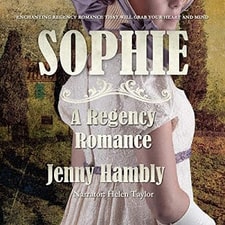 SOPHIE: A Regency Romance by Jenny Hambly.
SOPHIE: A Regency Romance by Jenny Hambly.My rating: 3 of 5 stars ⭐⭐⭐
Duration: 6 hrs 52 mins.
Publisher: Jennifer A. Hambly.
#BennetSistersScale: Jane - 🌹🌹🌹🌹 A sweet, clean romance, in which the characters are strongly principled, God-fearing, and loyal, and everything is wrapped up very neatly.
Sophie: A Regency Romance, Bachelor Brides Series, Book 2 by Jenny Hambly is a sweet Regency romance with an insatiable wanderlust and a jovial cast of characters who are all, in their own ways, searching for their happily ever after. Dispatched to the continent at the behest of his old Lieutenant, Sir Philip Bray finds himself in Europe alongside the enchanting, and infuriating, Lady Lewisham and her companion. Compelled to assist the unprotected pair, Sir Philip insists that they travel together to Italy, growing ever-closer along the way; much to their equal chagrin.
Audible Summary: "She is not interested in - or in any need of - a husband. He is as reluctant to take a wife...
Lady Lewisham is an independent woman of means who has just emerged from her year of mourning. Her late husband, Edward, has ensured she is financially comfortable for the rest of her life and has little to worry about. But as a young, beautiful, single widow (with an intelligent mind to boot), it seems she is a target for unwanted attention from ill-fitting suitors and mindless tittle-tattle from the gossip-mongers.
Audible Summary: "She is not interested in - or in any need of - a husband. He is as reluctant to take a wife...
Lady Lewisham is an independent woman of means who has just emerged from her year of mourning. Her late husband, Edward, has ensured she is financially comfortable for the rest of her life and has little to worry about. But as a young, beautiful, single widow (with an intelligent mind to boot), it seems she is a target for unwanted attention from ill-fitting suitors and mindless tittle-tattle from the gossip-mongers.
Feisty Sophie is a far cry from the usual timid, conventional woman befitting 19th-century society, however - in short, she is a breath of fresh air - and is not afraid to speak her mind. Nor does she suffer fools gladly. So when her husband's cousin, Lady Renfrew, invites her to visit London, she is delighted and uses this opportunity as a springboard for her much grander trip to Europe with her companion, Miss Trew.
Little does Sophie know, however, that when she encounters the handsome but devout bachelor Sir Philip Bray, her life is about to change. Although neither have any time or inclination for romance, their paths cross in England, France, and Italy. Could Sir Philip be the hero she thinks she does not need or want?
©2019 Jennifer Hambly (P)2019 Jennifer Hambly."
Sophie is nicely written, and is far more polished than Rosalind, but is still a little clumsy in places. There are a few references that did not feel as at ease in the period as they ought, such as Sophie musing that "her brain would not let her rest", when it would have been more appropriate to suggest that she could not quieten her mind. Overall the Regency colloquialisms are not as heavy-handed this time around, which was my main gripe with the first book, so they feel less gimmicky. Though the proliferation of extraneous detail still often feels designed to prove how much the author has researched the era rather than aiming to enhance the reader's experience. This audiobook spends too long telling us that it is embedded in the Regency, rather than showing us that it belongs there. I do appreciate accurate period details, but they risk becoming stifling when the determination to explain them intrudes upon natural dialogue, (such as when Lady Renfrew name-checks Byron, a specific title from his oeuvre, and the societal response to him, with all the subtlety of someone trying to conceal a product-placement advertisement on Instagram). This obsession with all things Byronic continues throughout, and though he was indeed a prominent figure at the time, there was very little benefit to making him quite such a cornerstone of this book.
Hambly's love of detail is far better served when describing Sophie's first glimpse of the Jura, and Lake Geneva. Her awed wonder and the vivid descriptions here do well to convey both her marvel and the beautiful landscape that provokes it. This, and the development of many of the characters, helps Sophie feel more accomplished than Rosalind, and I preferred it of the two. Though many characters fit the same mould as in Rosalind, such as a redoubtable dowager who immediately softens to the heroine, and a Godly lady's maid/companion who quotes bible verse. Speaking of which, there were times when this Biblical referencing felt a little preachy, especially when intended to make sinners repent. Christian Romance is, generally speaking, considered a sub-genre in and of itself and this series is not overtly advertised as such when perhaps it should be.
More sensitively handled were the heartbreaking descriptions of the dead and wounded on the battlefield, told in nightmarish flashbacks and devastating conversations between the former military men. The horror of losing friends and thinking themselves done for was tangible in those moments between sleeping and waking, life and death, sickness and health. Though not dwelt on for too long, they added a depth to this book that I was not expecting, but welcomed. I hope Harry gets a story soon, too. He brought much-needed levity to this book, and the early morning ride about the park was very good fun. His teasing manner would have been highly impertinent, but his good nature and enduring friendship with the feisty Belle helped him keep just the right side of the line. Despite these books being names after their heroines, it is often the heroes who really draw me in.
I was much less keen on Sophie's companion, Miss Trew accusing Sophie of "defaming" Sir Philip's character after he steals an inappropriate kiss from Sophie, nor her telling Sophie that it would not have happened if she had not ventured out alone. The attitudes of the day were very different to our own, but Sophie accepts this without railing against it or its injustice, which is inconsistent with her other views about women's rights and freedoms, and her frustration that the travellers' experience is so different for a man. Miss Trew is also very quick to forgive 'handsome' Philip for behaviour that would not have been considered acceptable from anyone else, which is irksome when she is set up as a paragon of propriety. I feel that there is a responsibility to balance historical ideals and practices with the modern awareness of their unpleasantness, not necessarily by drawing attention to it directly, but by not romanticising damaging behaviour. We live in a society that still blames women for not appropriately safeguarding themselves from harm, and need to find ways to challenge that, or at least not perpetuate it.
Similarly difficult was the conversation in which an intelligent, astute, caring older woman - who never married - is told that she could not be expected to comprehend another character's fears 'because she had never had children of her own'. It was not meant unkindly but felt incredibly patronising. Every childless/child-free woman listening will have heard a version of the same dismissal, and it only served to prove that maternal conceit has changed little in over two-hundred years. It could have been handled far better, or that line simply omitted, but I did like the wider - and much more compassionate - discussion had by the two women about the often-unspoken threat that accompanied childbirth in the era, and the way they "all know someone" who had died in the process. Given the statistics of the time, that twenty-percent of women died either during childbirth or shortly after, often from puerperal 'childbed' fever, that line was especially resonant. Women must have talked about such things, but we are seldom privy to those important conversations and it was moving to hear them discuss it here.
The narrator, Helen Taylor, has a pleasant voice and infuses the characters with personality, bringing each to life very nicely. Her narration was a little stilted now and then, with a few odd pauses, but these are easily eclipsed by the well-paced and lively passages.
The production quality was good overall, but it was unfortunate that a re-take was left in, with "You were quite remarkable Miss Trew, he said." repeated twice halfway through Chapter 5. There was also some white noise at the end of chapters where recordings had been paused or resumed, but none of it was too off-putting and did not detract from my enjoyment of the story.
I would certainly recommend this audiobook to everyone who enjoyed Rosalind, and lovers of sweet Regency romance in general, who like everyone to find their happily ever after.
*I received this audiobook free of charge in the hope of an honest, unbiased review.
(Click here to buy this book, listen to a sample, or add it to your wishlist!)












No comments